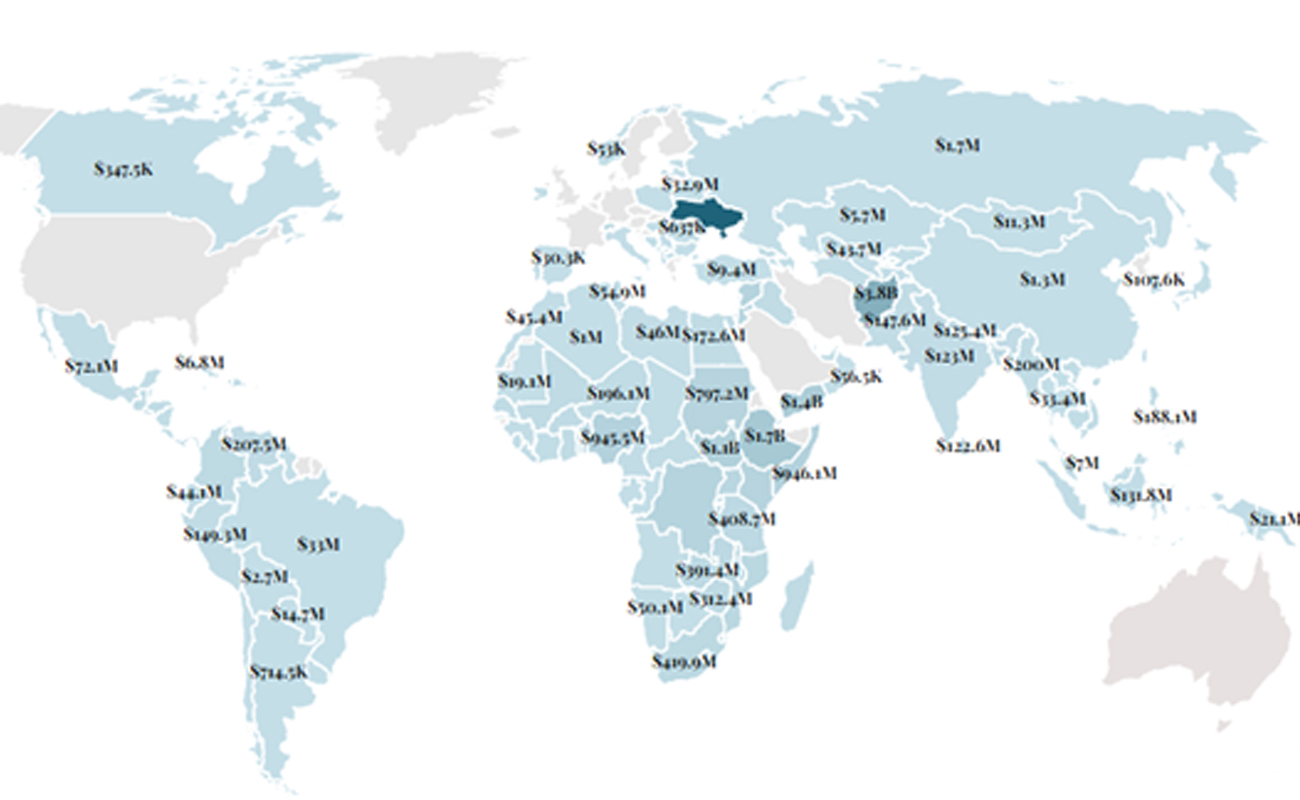The Global impact of U.S. Aid Suspension and Afghanistan’s struggle
Photo Credit: MAP 1: US Foreign Aid by Country
By Elham Kabir
Following the presidential inauguration on 20-Jan-2024, President Donald Trump announced a suspension of U.S. foreign aid for 90 days to review its efficacy, has triggered concerns globally. This pause, which affects a key source of humanitarian and development support for many countries, could severely disrupt life-saving programs and leave millions vulnerable. The consequences are especially severe for Afghanistan, where most of the population depends on external aid for subsistence.
With an allocated budget of over $60 billion annually, U.S. foreign aid has played a significant role in resolving global issues. One of the biggest beneficiaries has been Afghanistan alone, which between October 2021 and September 2023 received about $2.5 billion in development and humanitarian assistance. These fundings has alleviated millions of people's suffering by supporting live-saving programs in healthcare, food security, and education. The sudden stop in assistance could make already poor situations worse in places like South Sudan, Yemen, Somalia and Afghanistan, where U.S. aid is essential to maintaining fragile systems.
|
Sr. |
Country |
US Foreign Assistance (2022) |
% (vs.2021) |
Country by GDP (2022) |
|
1 |
Ukraine |
$10B |
7004.2% |
$162B |
|
2 |
Afghanistan |
$3.8B |
104.26% |
$14.5B |
|
3 |
Ethiopia |
$1.7B |
600.05% |
$126.8B |
|
4 |
Yemen |
$1.4B |
294.5% |
$23.53B |
|
5 |
South Sudan |
$1.1B |
368.59% |
$8.4B |
|
6 |
Somalia |
$946.1M |
3001.29% |
$10.42B |
|
7 |
Nigeria |
$945.5M |
196.72% |
$472.6B |
|
8 |
Democratic Republic of the Congo |
$840.9M |
273.77% |
$65.8B |
|
9 |
Syria |
$826.1M |
305.55% |
$23.6B |
|
10 |
Sudan |
$797.2M |
382.38% |
$51.67B |
Table 2: US Foreign Aid by Country
In Afghanistan, the suspension might grow an already shattering humanitarian crisis. Over 23.3 million Afghans currently rely on foreign aid, with the US as the largest and, following to that, Japan, the European commission, and Germany, with nearly 14 million on the brink of famine, according to the UN World Food Programme. Foreign aid accounted for massive portion of the country's GDP, covering more than half of the government's $6 billion annual budget and 75 to 80 percent of total public spending, and its absence will worsen food shortages, push healthcare systems closer to failure, and leave millions jobless. NGOs operating under struggled conditions may be forced to shut down, cutting off dire services such as food distribution, medical aid, and educational programs. The result will ripple through Afghan society, further destabilizing the economy and worsening poverty.
Following the halt in U.S. foreign aid, Afghanistan has experienced a significant decline of its currency. The exchange rate shifted from nearly 68-69 AFN per USD to 83.50 AFN per USD as of January 26, 2024. This drop is particularly concerning for a country where imports and exports are happening in U.S. dollars. The nation's imports are significantly more than its exports, as evidenced by the USD 5.16 billion peak trading deficit in 2023. A depreciating Afghani currency raises the price of imports, escalating the trade deficit and raising domestic prices for goods and services. This situation places additional constraints on an already fragile economy, potentially leading to inflation and reduced purchasing power for Afghans.
Furthermore, the next 90 days could also see rising food prices, worsening hunger, and increasing displacement within and outside Afghanistan. The increasing number of Afghan refugees would put further pressure on neighboring nations like Pakistan and Iran, which are already dealing with a significant number of them. The suspension is a geopolitical red flag regarding the United States' leadership in international humanitarian efforts. For decades, America has been a leading provider of aid, stabilizing conflict zones and reducing human suffering. This pauses risks ceding ground to countries like China, which may prioritize their strategic interests rather than humanitarian needs.
While the review of U.S. aid may aim to improve its efficiency, it is critical to expedite this process. Prolonged delays will deepen suffering, particularly in places like Afghanistan, where aid is a lifeline. The U.S. must ensure that its review is transparent and that funding resumes quickly to prevent long-term harm. In the meantime, other donor nations and humanitarian organizations, i.e., Japan, the UK, the European Commission, Germany, Canada, and others, must step in to fill the gap.
This suspension highlights Afghanistan's pressing need for self-sufficiency, although this objective is still decades away from being realized without sustained foreign assistance. The next few months will be crucial, not only for Afghanistan but also for the millions of people who depend on American assistance to survive worldwide. To guarantee that those who are most in need are not overlooked, this moment demands instant action and international solidarity.
Elham Kabir has a master’s degree in international relations. He has extensive professional experience of over 10 years, both in governmental and non-governmental entities, and in executive positions in Afghanistan.
Academicians and Officials interested to publish their academic pieces on this page, please approach us through: contact@aissonline.org.
The article does not reflect the official opinion of the AISS
Sources:
- USAID Data on Foreign Aid
- UN World Food Programme: Afghanistan Emergency
- ReliefWeb Reports on Afghanistan’s Humanitarian Crisis
- Brookings Institution Analysis on U.S. Aid and Global Power Dynamics

